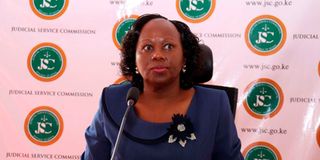CJ interviews: Prof Kameri-Mbote explains to JSC her role in BBI

Prof Patricia Kameri-Mbote when she appeared before the Judicial Service Commission on April 13, 2021.
Law professor Patricia Kameri-Mbote was on Tuesday hard-pressed by the Judicial Service Commission to explain how her experience in academia would help her transform the Judiciary as the search for the country’s Chief Justice entered its second day.
The law professor, who is the second candidate to appear before the 10-member interviewing panel, was also put to task to explain her involvement with the BBI process, which critics have argued risked interfering with the independence of the Judiciary by transferring the appointment of the Judiciary Ombudsman to the Office of the President.
The interviewing panel was particularly interested in how Prof Kameri-Mbote, who has spent over three decades in academia, would navigate the murky waters of the country’s apex court and the Judiciary at large, given her lack of experience as a practising lawyer or judge.
The questions asked to the law lecturer, included how she intends to solve the ever-recurring two-thirds gender principle – that was the subject of an advisory opinion by former Chief Justice David Maraga to President Uhuru Kenyatta to dissolve Parliament, the increasing backlog of cases in courts as well as the disobedience of court orders.
The panellists were also interested in understanding how previous utterances by Prof Kameri-Mbote, including one where she argued that she had become restless after failing to secure the position of dean at the University of Nairobi, would inform her temperament at the Supreme Court and Judiciary.
“You did mention that when you failed to become dean at the University of Nairobi, you became restless and went to Strathmore University, before moving back to UoN,” posed deputy chief justice Philomena Mwilu, a member of the interviewing panel who is the acting chief justice.
“I must mention that I was young and restless then. I was in my 40s and now I am heading to my 60s. There is something that comes with age and growing old,” Prof Mbote said.
Rejoinder
But Justice Mwilu, in a rejoinder, sought to know how the law professor would handle competing egos at the Supreme Court, a question that was also asked by Justice Mohammed Warsame, also a member of the interviewing panel.
“When you get to the court, you will no longer be my school mate, you will no longer be my lecturer. You will be the first among equals. Some of the judges there started with the court in 2011. Some of them have been there for five years, and surely they do have something you do not have. Please tell us how you would build collegiality,” asked Justice Mwilu.
In response, Prof Kameri-Mbote said her leadership would entail diplomacy and a culture of openness.
“When you work in a group, there will be a dominant person. And I can be that dominant person. But then, you have to let others share their views freely and openly. There must be a need to build collegiality,” she said.
“You are joining a court that is restless in Jurisdiction. How do you intend to solve that?” asked Justice Warsame.
“That we are both restless is going to bring healthy tension. Encourage members of the Supreme Court to use their individual minds and pens so (that) we can move the jurisprudence of the court to a new level,” responded Prof Mbote.
“One of the things we could do is have a reflection that covers those issues and how they affect the perception of the court in the eyes of the public,” she added.
But perhaps the toughest question to Prof Mbote touched on her position on the BBI document and whether her involvement in the ongoing process would affect her rulings on the document, should a complaint be filed in court.
Prof Mbote, however, said she was remotely involved in the BBI process and has only studied the document and its effects on law application but as a scholar.
BBI process
“I was not involved in the BBI process. I was out in the village and someone called me to say that they (BBI drafters and campaigners) were looking for a scholar to present this thing to Kenyans. I asked why they couldn't present it themselves but I wasn't told so I don't know. I agreed (to present the BBI document)," Prof Mbote in response to Justice David Majanja.
The panellists also pressed her to illustrate how, through instinct and legal standing, she would resolve the longstanding struggle on the two-thirds gender principle.
Other issues were the unresolved issue of the appointment of the 41 judges, and the consistent backlog of cases in courts, as well as the disregard of court orders, some of the most pressing issues facing the Judiciary at the moment.
“You mentioned that you are not seeking employment but want to make a difference. Of course, you are an academic, but not a jurist. What makes you think you can make a difference in the courts and judiciary,” said Justice Warsame.
Her response: “I think the skills we get in different places are transferable. I will not be the first persons who came to the SC without having been at the Judiciary. If others can learn then I can also learn.”
“Can you tell us what would be your gut solution to solve the two-thirds gender rule,” asked said Justice Warsame.
“I am a thinker, I don’t have a gut solution. You need to deal with the processes that build leaders. One of this is that you need to deal with quotas, which has been the case with the county assemblies, even the National Assembly for the 47 women representatives,” she said.
“We get into affirmative action shabbily and have missed the opportunity of dealing with equality and it is not just gender. We even have marginalised communities.”
Seeking compliance
And on the obedience of court orders, she said she would involve the relevant agencies in seeking compliance.
“Once you give orders, there would be parties that follow up. I wouldn’t keep a black book, but I would be concerned about this wanton disregard of court orders,” said Prof Mbote.
Prof Mbote is the second candidate to go through the interview process as the Judicial Service Commission searches for Kenya's third Chief Justice under the 2010 Constitution, and one other judge of the Supreme Court.
She says that the JSC is underfunded yet has many training needs. If appointed Chief Justice, Prof Mbote says she will leverage on her networks to get more training for judicial officers like judges and magistrates.
"Diplomacy and negotiations are some of the ways you can resolve these issues. And you were my senior in school so what I miss I can also learn from you," Prof Mbote said while addressing DCJ Mwilu's query on how she would handle the tension between the Judiciary and Executive.
The exercise that commenced Monday will seek to replace Justice David Maraga, who retired early this year.
All 10 JSC commissioners – Deputy Chief Justice Philomena Mwilu (Supreme Court), Justice Mohamed Warsame (Court of Appeal), Justice David Majanja (High Court), Ms Olwande (Chief Magistrates Court), Macharia Njeru (Law Society of Kenya), Ms Ann Amadi (Judiciary Registrar), Mr Kihara Kariuki (Attorney General), Patrick Gichohi (Public Service Commission), Mr Felix Koskei (public representative) and Prof Olive Mugenda (public representative) – are presiding over the selection process.
Prof Mugenda is chairing the panel that will forward the best candidate’s name to Parliament for vetting. If MPs approve the candidate’s selection, his or her name will be forwarded to President Uhuru Kenyatta for the appointment.
The JSC will also hire another Supreme Court judge to replace Justice Jackton Ojwang who retired last year.





